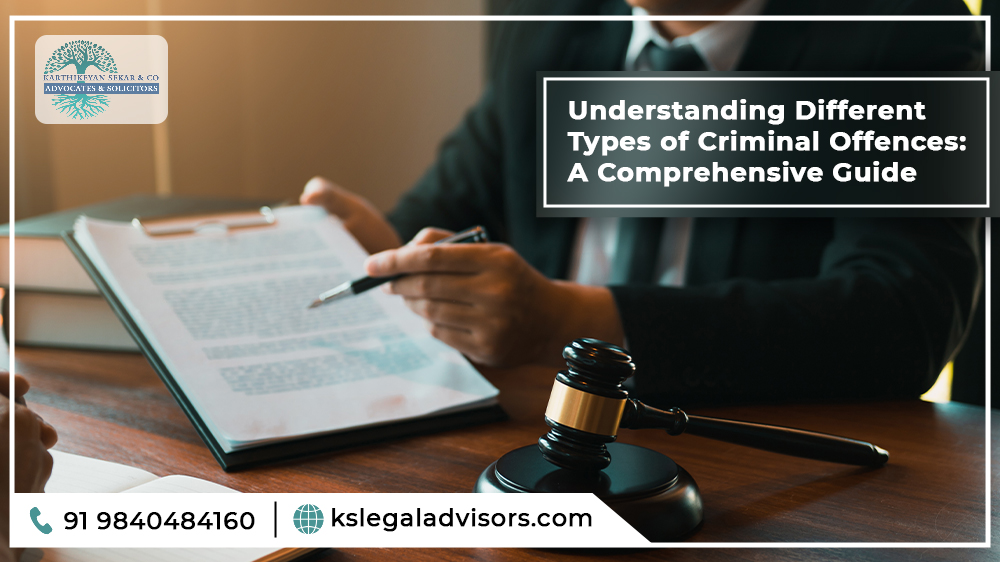Understanding Different Types of Criminal Offences: A Comprehensive Guide
The term “Offence” typically means a transgression of law or an infraction of any rule, code or law. A criminal offence is any act, sin or scandal that is punishable by law due to its law-breaking nature. In India, Criminal Offences are categorised into 5 different types:
- Offences against a person – (ex. rape, murder, child/women trafficking, homicide, abduction, wrongful confinement, dowry harassment, etc)
- Offences against property – (ex. robbery, theft, extortion, criminal breach of trust, misappropriation of property, etc)
- Statutory Criminal Offences – (Ex. possession and consumption of drugs, drunk driving, traffic offences, etc)
- Financial Criminal Offences – (Ex. tax evasion, money laundering, embezzlement, fraud, etc)
- Inchoate Criminal Offences – (ex. Abetting, conspiracy, aiding in crimes, attempting crimes, etc)
The gravity and complexity of the above-mentioned categories of offences are thoroughly explained in the Code of Criminal Procedure, 1973 (CrPC) which provides various classification of such offences and acts as a comprehensive guide in understanding the different types of criminal offences in India so you can contact an appropriate criminal lawyer service accordingly.
CLASSIFICATION OF CRIMINAL OFFENCES:
The CrPC classifies criminal offences as follows:
- Cognizable and non-cognizable offence
- Bailable and non-bailable offence
- Compoundable and non-compoundable offence
Cognizable and non-cognizable offence:
Section 2(c) of the Code of Criminal Procedure defines Cognizable offences. These types of offences are serious or grievous in nature which carry severe punishments in the Penal Code. In such offences, police officers can arrest the accused without an arrest warrant. They also have the legal duty to initiate investigation without a prior permission from the Magistrate. Cognizable offences are punishable with imprisonment for three years or more.
Cognizable Offences examples: Murder, dowry death, rape, etc.
Non-Cognizable offences are defined under Section 2(l) of the Code of Criminal Procedure. They are less serious in nature. In simple words, non-cognizable offences are less grievous and police officers do not have the legal authority to carry out an arrest without the issue of an arrest warrant from the courts of law. Therefore, in such cases, the aggrieved party is expected to proceed to their nearest police administration or the judiciary to initiate criminal proceedings against the accused. Offences that are non-cognizable are punishable usually with imprisonment for less than three years or with a fine or both.
Non-Cognizable Offences examples: Defamation, forgery, fraud, etc
Bailable and non-bailable offence:
Bailable offences are defined under Section 2 (a) of the Code of Criminal Procedure where bail is a right given to the accused. In such offences, if the police administration arrests a person without a warrant for a bailable offence, the arrested person has an absolute right to be released on bail, provided that such person pays the bail amount, which is fixed by the court of law. Bailable offences typically include non-grievous or simple offences that are punishable with less than three years of imprisonment or with a fine.
Bailable offences examples: Cheating, forgery, public nuisance, death by negligence, etc.
Non Bailable Offences are defined under Section 2(a) of the Code of Criminal Procedure. As the name suggests, bail is not a matter of right in these offences and is based solely on the Judicial Magistrate’s discretion. These offences are heinous and are typically punishable with more than three years of imprisonment or fine or both.
Non- Bailable offences examples: Rape, murder, robbery, theft, dowry death, causing miscarriage without a woman’s consent.
Compoundable and non-compoundable offence:
Compoundable Offences refers to offences where the aggrieved party and the accused can come to an understanding and settle matters by way of an agreement. In simpler words, the aggrieved party can withdraw any prosecution against the accused if the accused can settle for a consideration, compensation or gratification. The CrPC provides the list of criminal offences which are compoundable under Section 320. The provision also classifies compoundable offences into two subclasses,
(i) Offences which can be compounded without the intervention of a court of law and, s
(ii) Offences which can be settled with the permission of a court of law.
Compoundable Offences where court intervention is not required: Cheating, Adultery, Trespassing, defamation, etc
Compoundable Offences where court intervention is required: Domestic violence, Assault on a woman with the intention to outrage her modesty, causing grievous hurt, etc.
Non-compoundable offences are cases where the aggrieved and the accused cannot settle matters by way of an agreement among themselves and require criminal lawyer service to intervene. Offences not mentioned in the CrPC list of compoundable offences under Section 320 fall under the category of non-compoundable offences. These offences are heinous in nature and cannot be settled by means of an agreement. In other words, an agreement that is executed to affect the compounding of an offence that is non-compounding in nature is void in the eyes of law. Only the apex court has the authority to permit the compounding of a non-compoundable offence.
Non-compoundable offences examples: Rape, Murder, homicide, dowry death, etc.
Why do you need a good criminal lawyer in a criminal case?
As simple citizens of the country, it is impossible to understand the complex criminal justice system without a proper understanding of the criminal offences and the judicial process. A trained criminal defence lawyer or a white-collar crime lawyer will make sure to protect your interest and handle your case or dispute with utmost skill and proficiency. Hence, the first step towards any legal concern is to contact a good criminal litigation law firm or get in touch with trained criminal lawyers in Chennai to ensure your legal matters are handled diligently!

